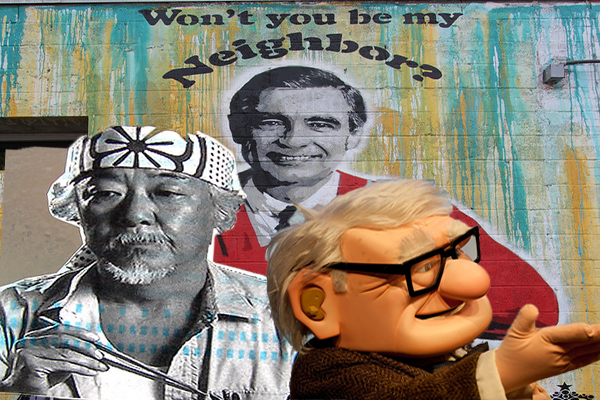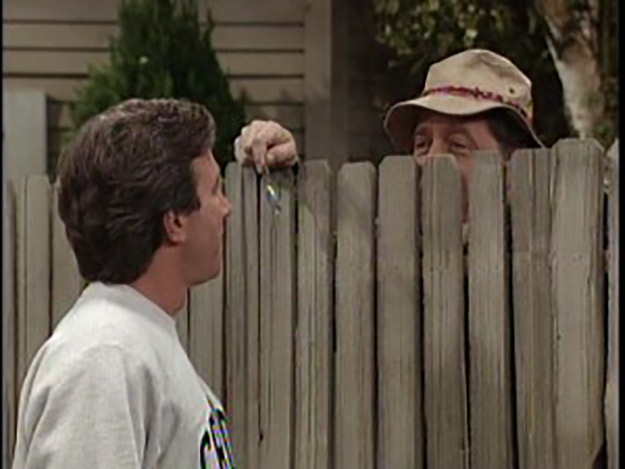
The other day, I was watching The Karate Kid. Any 80s or 90s kid will tell you the story. It’s the tale of a young Italian kid who was facing bullying, but then met a man from Okinawa known as Mr. Miyagi. Miyagi becomes the kid’s role model, and teaches him how to use self-defense. At first glance, this is a story about learning martial arts and learning other cultures.
But, this time around, I noticed that there was something about this movie that I hadn’t seen in about 10 years. I noticed that this movie had a trope that had fallen by the wayside. All of a sudden, a lot of the complaints I’ve heard from my guy friends made a lot more sense.
Photo: Mr Miyagi (Doran via Flickr) Mr. Rogers (Sean O’Neill via Flickr) Carl Fredricksen (Josh Hallett via Flicker)
What Is A Trope?
A trope is a stereotype that’s found in the plot of a movie, book, television show, or game. Good examples of classic TV tropes include the femme fatale, futureshadowing, and the hard-boiled detective who the rest of the police force seems to hate. You get the idea.
One of the tropes that most people overlook is the trope of having a Neighborhood Father Figure. The Neighborhood Father Figure is a man who acts as a mentor to a younger guy, despite not being a parent or school teacher. They may be childless and partnerless. They may also be a little strange or strict at first but turn out to wonderful characters and mentors
It’s a male figure who can help a younger man figure out parts of life. This is the character that neighborhood kids would go to for advice, even if it means just leaning over the fence for a chat. Sometimes, the Neighborhood Father Figure would also bring the younger boy for an adventure, too.
Mr. Miyagi is one of the best examples of the trope that I can think of, but there are so many more out there. Once upon a time, characters like Clutch Cargo, Mr. Rogers, Home Improvement’s Mr. Wilson, Carl Fredricksen (from Up) as well as Mr. Wilson from Dennis the Menace (to a point) helped show kids that older adults could act as guides.
It is the Neighborhood Father Figure trope that I’ve noticed disappear as of late. And if you ask me, it’s a goddamn tragedy.
Why Did The Neighborhood Father Figure Die?
A lot of the tropes that are no longer used in society tend to fall out of favor as a result of cultural shifts. In some cases, like The College Widow (younger widows who once married professors but continued to live on-campus after their spouses died), the reason they fall out of favor is because these things no longer happen. Other times, it’s due to a change in attitude.
For example, one of the more common tropes involved platonic best friends who were roommates—most of the time, male roommates. This was popular in kids’ shows, until people started to assume that these pairs of guys were gay. This led to characters like Bert and Ernie from Sesame Street being cancelled.
So, what made the Neighborhood Father Figure die, you ask? I believe that this innocuous trope was killed as a result of the increased concern over stranger danger. More specifically, people began to see male neighbors who wanted to be mentors to kids as potential perverts.
Think about it this way. Our society constantly has stories about male teachers acting inappropriately with students, male priests behaving inappropriately with choir boys, and more. It’s gotten to the point where many parents feel leery about having male teachers of any sort near their children.
Considering how much bad news parents get pummeled with on a daily basis, it’s hard to blame them for being vigilant around older people near their kids. That’s why most parents would be horrified at the idea of having kids hang out with an older childless adult after school the way The Karate Kid had.

Putting Men In Mentors
The death of the Neighborhood Father Figure trope is a serious tragedy, and not just because of the sad state of society it reflects. It’s also a tragedy because younger boys are increasingly losing out on seeing positive male role models in their media. More devastating, perhaps, is the loss of seeing mentorship in action.
Over the past couple of months, I’ve mentioned fictional father figures to my male friends. Many of them noticed the dying trope too—though at least two mentioned Uncle Iroh from Avatar to be a good example of a wholesome cartoon dad.
It’s amazing how much seeing mentorships in action can help guys. Though many of the movies that had this trope were in the past, several of my friends’ eyes still light up as they talk about them. Even so, it’s often with a tinge of sadness that they mention the loss of seeing male mentors in movies.
“Sometimes, you can’t go to teachers or coaches,” my husband said over dinner. “I just wish others would realize that you really need to show guys that having neighbors or coworkers who help you out is important. It’s so easy to feel like you’re just expected to do everything yourself.”
No Mentor, No Healthy Masculinity
The older I get, the more I look at the men around me and notice a stark divide. I’m talking, of course, about the divide between healthy and unhealthy men. Or rather, the divide on how men are turning out after dealing with society.
Around my cadre of friends, most of the guys had positive role models. Some had great dads. Those who didn’t, often had older male friends (or friends’ parents) who helped advise them and shape them into the people they are now. They’re mostly chill dudes in relationships. While they still occasionally struggle, they’re alright.
And then, there are the others.
As years passed, I noticed a growing group of guys who are extremely emotionally unwell. They often lash out at women, refuse to try any sort of self-improvement, and typically blame others for whatever misfortunes they have. They’re clearly lost. They don’t have a purpose, and often aren’t really pleasant to be around regardless of the gender you happen to be.
The guys in the second group go by a wide range of different names, but they all seem to have one thing in common. Most of the guys in this group don’t have a male mentor who encourages them to be good people. Mentors are there to teach and guide you when you feel lost—and we all feel lost from time to time.
Mentorless people tend to turn to the internet for advice, and that’s rarely a good idea. What happens when you feel lost, then end up getting fed the wrong information? It’s simple. You end up making worse mistakes, then get angry because the thing you read was supposed to work.
Since the internet’s also an echo chamber, you end up with increasingly bad advice, too. It’s a bad spiral that men (and women) are increasingly at risk of entering. This is the type of problem that can only be solved in-person, through real-life interactions. No amount of internet or medication will fix the attitudes you get when you’re lost and misinformed.
We Need To Bring Back Neighborhood Male Mentors
They often say that it takes a village to raise a child, and that’s true. Historically, entire communities would pitch in to make sure kids had good role models. Unfortunately, we’re living in a society that’s increasingly expecting parents to be everything to their kids. That’s just not possible, nor is it healthy.
If we want to see men have healthy relationships with everything from their self-image to women, we need to bring back male mentors. We need to stop treating men like sex offenders, and start realizing that many guys out there want to help the next generation get better.
Our society needs to start embracing healthy support networks involving older males as a whole. Otherwise, all we’ll have left is an empty feeling in our collective heart and endless reruns of The Karate Kid to show people how things used to be.
